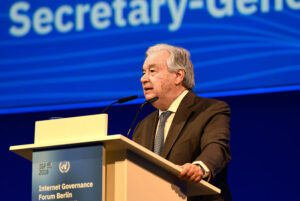Four inter-governmental bodies, namely the United Nations (UN) Special Rapporteur on the Promotion and Protection of the Right to Freedom of Opinion and Expression; the Organization for Security and Co-operation in Europe (OSCE) Representative on Freedom of the Media; the Organization of American States (OAS) Special Rapporteur on Freedom of Expression; and the African Commission on Human and Peoples’ Rights (ACHPR) Special Rapporteur on Freedom of Expression and Access to Information in Africa, have called on Governments to ensure the safety and participation of women in online platforms in a joint declaration on freedom of expression and gender justice issued in May 2022.
In the joint declaration, they made recommendations to address critical freedom of expression and gender justice issues around the elimination of discrimination and prejudice; access to information; gender-specific restrictions on expression; online sexual and gender-based violence; and human rights due diligence.
Adopted, on May 3, 2022, they recalled and reaffirmed, in the declaration, the various other joint declarations they made in the past two decades on the same issues.
The declaration underlined the critical role that the right to freedom of opinion and expression plays in the promotion and protection of human rights and dignity, the advancement of sustainable development, and the supporting and strengthening of democratic societies;
It highlighted that freedom of expression is critical for women’s empowerment, equality, enjoyment of economic, social and cultural rights, as well as for civil and political rights, and full participation in public life, noting that gender equality and the right to freedom of opinion and expression are mutually reinforcing, indivisible and interdependent.
The declaration emphasised that gender justice signifies transformative changes to remove structural and systemic barriers and create an enabling environment in which women (and others who suffer discrimination on account of sex or gender) can exercise their rights and participate fully and equally in the private, public and political sphere.
It also recognised the importance of the internet and digital technology in bolstering freedom of expression and access to information globally, and promoting the empowerment of women and others who experience discrimination and marginalization.
The bodies deplored the structural obstacles, including sexual and gender-based violence, misogyny, entrenched bias, social prejudices, patriarchal conventions, and interpretations of cultural and religious norms, as well as discriminatory laws, policies and practices and unequal access to digital technology and participation in the media that prevent women’s equal enjoyment of freedom of expression.
They expressed deep concerned that online gender-based violence, gendered hate speech and disinformation, which cause serious psychological harm and can lead to physical violence, are proliferating with the aim of intimidating and silencing women, including female politicians, journalists and human rights defenders.
They also condemned online attacks and harassment of women journalists as one of the most serious contemporary threats to their safety and damaging to media freedom, noting that independent, free, pluralistic and diverse media are essential in a democratic society and that gender inequality diminishes media pluralism and diversity.
They also expressed alarm at the increasing use of frivolous and vexatious lawsuits to dissuade women from participating in public life or from speaking out against alleged perpetrators of sexual and gender-based violence; and recognised the need for inclusion and sensitivity to the intersectionality of gender and other characteristics that cause or exacerbate women’s experience of discrimination, including race, religion, ethnicity, sexual orientation, disability, age, legal and socio-economic status or other factors.
The declaration noted that both sex and gender have been the basis for inequality and discrimination in the exercise of freedom of opinion and expression and that while the Declaration focuses primarily on women, where appropriate, reference is made to gender non-conforming people (lesbian, gay, bisexual, transgender and questioning or LGBTQ+ individuals)
Noting further that the term “women” in the Declaration also refers to girls in the appropriate context, it made recommendations in the five broad areas.
To download and read the full document, please click the Joint Declaration.







